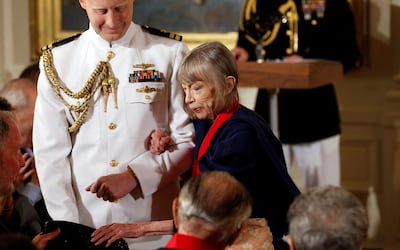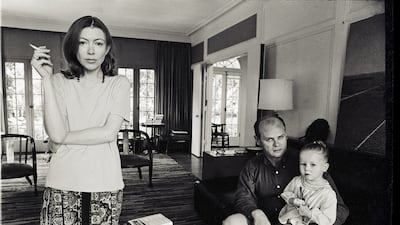Author Joan Didion, a US literary icon credited with ushering in "new journalism” with her essays on Los Angeles life in the tumultuous 1960s, died on Thursday. She was 87.
Didion, a successful reporter, film screenwriter and novelist known for her piercing insights and understated glamour, died at her home in New York from complications of Parkinson’s disease, her publisher said.
“We will mourn her death but celebrate her life, knowing that her work will inspire generations of readers and writers to come,” said her editor, Shelley Wanger, at Penguin Random House’s Knopf imprint.
Didion's early work included her seminal 1968 first-person essay collection Slouching Towards Bethlehem – which delighted critics and made her a bona fide star – and Play It as It Lays, a novel about Hollywood lives.
The White Album, an essay collection that depicted West Coast hippie counterculture, the rise of the Black Panthers and the notorious Manson murders, is perhaps Didion's most widely recognised work, starting with the famous sentence: “We tell ourselves stories in order to live.”
Didion and her husband John Gregory Dunne penned screenplays including Al Pacino’s romantic drama The Panic in Needle Park.
In 1976, they rewrote romantic musical A Star is Born, resulting in the smash box-office hit starring Barbra Streisand and Kris Kristofferson.
Other scripts included True Confessions, starring Robert De Niro and Robert Duvall, and Up Close and Personal, an adaptation of a biography of US news anchor Jessica Savitch featuring Robert Redford and Michelle Pfeiffer.
As well as her acuity in describing contemporary American society, Didion became renowned for her autobiographical talents.
Decades after her heyday as a Hollywood socialite, screenwriter, essayist and novelist, Didion found herself again in the spotlight for her searingly honest writing on bereavement following a harrowing double tragedy.
Didion was 69 when Dunne suffered a fatal heart attack and, less than two years later, the couple’s adopted daughter, Quintana Roo, was killed at age 39 by acute pancreatitis.
She explored her devastating loss in her 2011 memoir, Blue Nights.

'Modern classics’
“Didion was one of the country’s most trenchant writers and astute observers,” said Knopf executive Paul Bogaards in a statement to AFP.
“Her bestselling works of fiction, commentary, and memoir have received numerous honours and are considered modern classics.”
Didion was born in Sacramento, California, in 1934.
She began her career as a proofreader with Vogue in New York, and published her first novel, Run River, about a family’s disintegration, in 1963.
She met Dunne, who was then writing for Life magazine in the city.
Her other novels include A Book of Common Prayer, set in a fictional Central American country, and The Last Thing He Wanted.
Didion was awarded a National Medal of Arts and Humanities by president Barack Obama in 2013.
In 2017, she was profiled in the Netflix documentary Joan Didion: The Centre Will Not Hold, directed by Griffin Dunne, the son of her brother-in-law.

